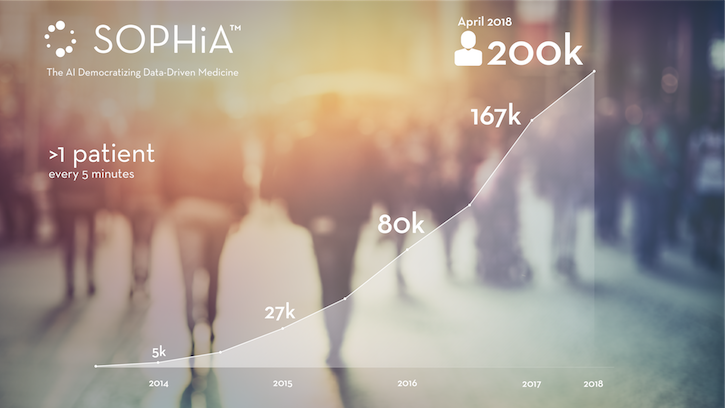Think Healthcare Has Yet to Benefit from AI? 200K Patients Say Otherwise
SOPHiA Genetics, a Swiss health-tech company, is celebrating a diagnostics milestone and a $1.4 billion windfall for AI overseas.
Before SOPHiA Genetics got off the ground in 2011, its leaders knew they wanted to make healthcare sustainable. They planned to use artificial intelligence (AI) to help providers treat more patients, more effectively. They hoped to build a “collective intelligence” comprising patient data from across the world, a sort of database and insight factory. Now, in 2018, it all appears to be coming together.
SOPHiA announced this week that its AI technology for clinical genomics has helped “better diagnose” 200,000 patients. When Healthcare Analytics News™ spoke to CEO and founder Jurgi Camblong late last year, the company’s products were in 370 hospitals; that number is now 430, in 60 countries, for a rate of 1 diagnosis every 5 minutes, according to the company. If you go by SOPHiA’s press release, this “rapid adoption” stems from the efficacy of its decision-support tool and clinician trust.
>> READ: How AI Is Shaking Up Healthcare, Beyond Diagnostics
“When we started, we never dreamed would be able to build this collective intelligence out with 1 patient every 5 minutes, on 5 continents,” Camblong told this magazine in December. “If you were with us, you would feel the passion that our people give to the company, with, really, the ambition of impacting patient health.”
Given AI’s novelty in healthcare, the company’s progress could mean as much for the broader technology as its own interests. Some in healthcare still doubt AI’s value and its future in medicine, as shown in this video roundup from HIMSS18. “Artificial intelligence, broadly defined, is overhyped,” said David Levin, MD, CMO of Sansoro Health. Others, meanwhile, question how patients will take to it or whether the problem with AI is merely how it’s sometimes discussed—in terms of tech, not medical solutions.

So, when a company like SOPHiA Genetics blends algorithms and genomic data to help physicians reach the right diagnoses for patients with cancer or hereditary diseases, it’s reason to take notice, especially at scale.
What’s more, the milestone coincided with the United Kingdom’s £1.4 billion commitment to artificial intelligence. In SOPHiA’s eyes, that funding confirmed “the importance of this new research and business space,” the company noted.
The start-up and healthcare at large still face challenges in embedding tech into care. In the interview with Camblong, he pointed to a need for better data protection across the industry and patient ownership of data. (SOPHiA said its European roots have helped advance its privacy and security efforts.)
But another issue stems from hospital practices. Camblong also called for healthcare organizations to break down their internal walls and foster greater collaboration between departments if they aspire to predict, for instance, which treatments will work best. “This is really the long-term vision that we need to achieve in healthcare,” he said. “We need to break silos within hospitals.”
For now, however, SOPHiA is trudging forward in spite of the challenges that are endemic to medicine. In 2017, the MIT Technology Review named it one of the 50 “smartest companies,” a spot ahead of Tesla. But the real sign of success—clinical adoption—might be worth more than any printed accolade.
Get the best insights in healthcare analytics directly to your inbox.
Related
The Barriers to True Healthcare AI
AI Goes Live for Clinical Pathology
What’s the Difference Between AI, Machine Learning, and Analytics?